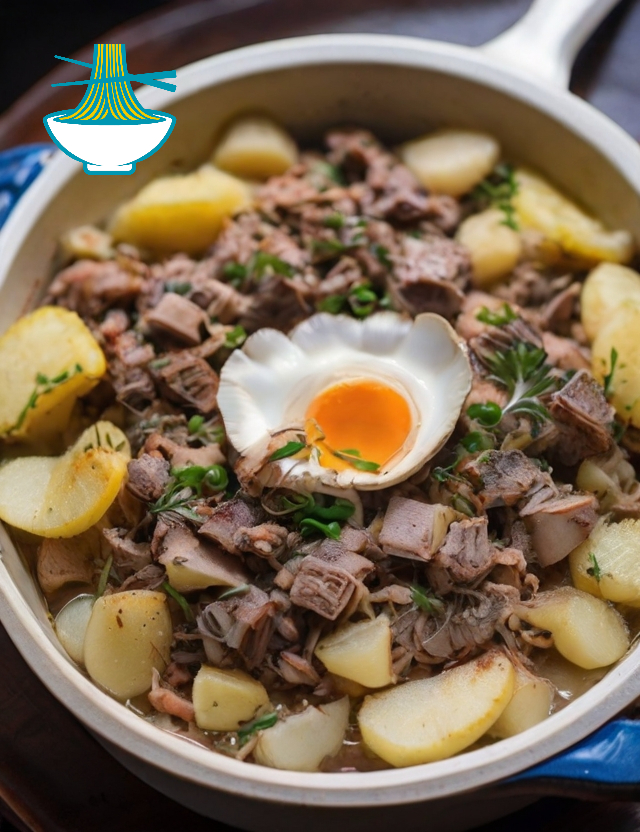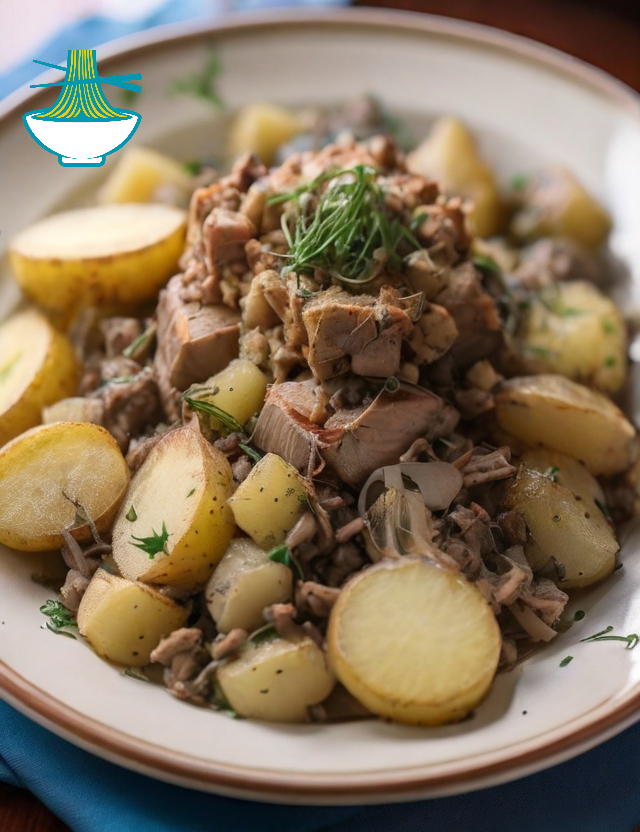Welcome to the enchanting world of Bermudian cuisine, where the azure waters of the Atlantic Ocean meet the vibrant flavors of the island's culinary traditions. Today, we embark on a gastronomic journey to discover a unique and delectable dish – Bermuda Shark Hash. This delightful recipe brings together the freshness of local ingredients and the rich maritime heritage of Bermuda, creating a savory symphony that will transport you to the sun-kissed shores of this tropical paradise.
The star of our culinary adventure is the Bermuda shark, a staple in the island's waters. Combined with a medley of aromatic herbs, spices, and root vegetables, the shark hash promises to tantalize your taste buds and introduce you to the bold and diverse flavors that define Bermudian cuisine.
Join us as we unravel the secrets behind creating this mouthwatering Bermuda Shark Hash – a dish that not only pays homage to the island's maritime culture but also captures the essence of the warm and inviting spirit that makes Bermuda a true culinary gem in the heart of the Atlantic.

Ingredients:
- 1 lb Bermuda shark fillets, diced
- 3 large potatoes, peeled and diced
- 1 large onion, finely chopped
- 2 cloves garlic, minced
- 1 bell pepper, diced
- 2 tomatoes, diced
- 2 tablespoons olive oil
- 1 teaspoon thyme, dried
- 1 teaspoon parsley, chopped
- 1 teaspoon paprika
- Salt and pepper to taste
- Hot sauce (optional, for an extra kick)
- Fresh lemon wedges for serving
Instructions:
Prepare the Shark:
1-Rinse the shark fillets under cold water and pat them dry with paper towels.
2-Dice the shark into bite-sized pieces and set aside.
Prep the Vegetables:
1-Peel and dice the potatoes into small cubes.
2-Finely chop the onion, mince the garlic, dice the bell pepper, and chop the tomatoes.
Sauté the Aromatics:
1-In a large skillet or pan, heat olive oil over medium heat.
2-Add the chopped onions and garlic, sautéing until they become translucent.
Cook the Shark:Add the diced shark to the skillet, stirring occasionally until the shark pieces are lightly browned.
Add Vegetables:Incorporate the diced potatoes and bell pepper into the skillet, continuing to cook until the potatoes begin to soften.
Seasoning:
1-Sprinkle thyme, parsley, paprika, salt, and pepper over the mixture, ensuring even distribution of the seasonings.
2-If you desire some heat, add hot sauce to taste.
Simmer:Reduce the heat to low, cover the skillet, and let the ingredients simmer until the potatoes are tender and the shark is cooked through. This typically takes about 15-20 minutes.
Final Touch:
1-Gently fold in the diced tomatoes, allowing them to soften and release their juices.
2-Taste and adjust seasoning as needed.
Serve:
1-Once the potatoes are fork-tender and the shark is cooked, remove the skillet from heat.
2-Serve the Bermuda Shark Hash hot, garnished with fresh parsley and accompanied by lemon wedges for a zesty finish.
Enjoy this traditional Bermudian delight that captures the essence of the island's flavors and culinary heritage
Nutritional Values for Ingredients|
1 lb Bermuda shark fillets, diced
3 large potatoes, peeled and diced
1 large onion, finely chopped
2 cloves garlic, minced
1 bell pepper, diced
2 tomatoes, diced
2 tablespoons olive oil
1 teaspoon thyme, dried
1 teaspoon parsley, chopped
1 teaspoon paprika
Salt and pepper to taste
Hot sauce (optional, for an extra kick)
Fresh lemon wedges for serving
It's challenging to provide precise nutritional values without specific quantities and serving sizes. However, I can offer you a general idea of the nutritional content of some key ingredients in the Bermuda Shark Hash recipe.
1 lb Bermuda shark fillets (raw):
- Calories: Approximately 200-250 kcal
- Protein: Approximately 40-50 grams
- Fat: Approximately 2-5 grams
- Omega-3 Fatty Acids: Varies
- Other nutrients: Vitamin B12, selenium, phosphorus
benefits
- Rich in protein, essential for muscle health.
- Contains omega-3 fatty acids, promoting heart health.
- Provides vitamin B12, vital for nerve function.
- Good source of selenium, supporting the immune system.
3 large potatoes:
- Calories: Approximately 300-400 kcal
- Carbohydrates: Approximately 70-90 grams
- Fiber: Approximately 10-15 grams
- Protein: Approximately 7-10 grams
- Other nutrients: Vitamin C, potassium, vitamin B6
benefits
- High in complex carbohydrates for sustained energy.
- Excellent source of dietary fiber, aiding digestion.
- Contains vitamin C for immune support.
- Provides potassium, essential for heart and muscle function.
2 tablespoons olive oil:
- Calories: Approximately 240 kcal
- Fat: Approximately 28 grams
- Other nutrients: Monounsaturated fats (heart-healthy), vitamin E
benefits
- Healthy monounsaturated fats promote heart health.
- Source of vitamin E, an antioxidant that protects cells.
- May help reduce inflammation in the body.
1 large onion:
- Calories: Approximately 60 kcal
- Carbohydrates: Approximately 15 grams
- Fiber: Approximately 3 grams
- Protein: Approximately 1.5 grams
- Other nutrients: Vitamin C, potassium, and various antioxidants
benefits
- Low in calories and a good source of dietary fiber.
- Contains antioxidants that may have anti-inflammatory effects.
- Provides vitamin C, supporting immune health.
1 bell pepper:
- Calories: Approximately 25 kcal
- Carbohydrates: Approximately 6 grams
- Fiber: Approximately 2 grams
- Protein: Approximately 1 gram
- Other nutrients: Vitamin C, vitamin A
benefits
- Low in calories and rich in antioxidants.
- Excellent source of vitamin C for skin and immune health.
- Contains vitamin A, important for vision and skin health.
2 tomatoes:
- Calories: Approximately 50 kcal
- Carbohydrates: Approximately 12 grams
- Fiber: Approximately 4 grams
- Protein: Approximately 2 grams
- Other nutrients: Vitamin C, potassium, lycopene
benefits
- Low in calories and high in antioxidants.
- Rich in vitamin C, promoting collagen formation.
- Contains lycopene, which may have heart health benefits
1 teaspoon thyme (dried):
- Calories: Approximately 3 kcal
- Carbohydrates: Approximately 1 gram
- Fiber: Approximately 1 gram
benefits
- Contains antioxidants with potential health benefits.
- May have antimicrobial properties.
- Adds flavor without additional calories.
1 teaspoon parsley (chopped):
- Calories: Approximately 1 kcal
- Carbohydrates: Approximately 0.1 gram
- Fiber: Approximately 0.1 gram
- Other nutrients: Vitamin C, vitamin K
benefits
- Low in calories and a good source of vitamin K.
- Contains vitamin C, supporting immune health.
- Adds freshness and flavor to dishes.
1 teaspoon paprika:
- Calories: Approximately 6 kcal
- Carbohydrates: Approximately 1 gram
- Fiber: Approximately 1 gram
benefits
- Low in calories and adds flavor to dishes.
- Contains antioxidants, such as beta-carotene.
- May have anti-inflammatory properties.
Salt and pepper to taste:
- Negligible caloric content
benefits
- Adds flavor to the dish.
- Salt provides essential minerals, but moderation is key.
Hot sauce (optional):
- Calories, sodium, and spiciness will vary depending on the brand and type of hot sauce used.
benefits
- Adds heat and flavor to the dish.
- May boost metabolism and provide a sense of fullness.
Fresh lemon wedges for serving:
- Negligible caloric content
benefits
- Adds a burst of citrus flavor to enhance taste.
- Excellent source of vitamin C, supporting immune health.
Keep in mind that these values are estimates and can vary based on factors such as specific brands, preparation methods, and individual variations in the ingredients. If you require more accurate nutritional information, it's advisable to use a nutritional calculator based on the specific quantities and brands you use in your recipe.


Comments